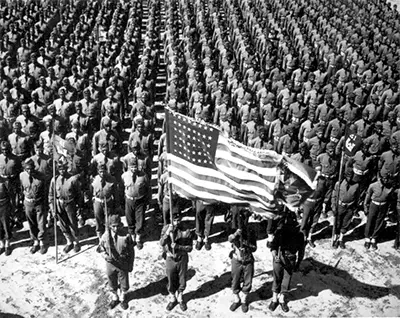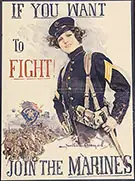America in World War I
At the outbreak of war, the United States of America (“America”) stated that it would remain neutral. This was despite a strong relationship with many Allied Powers. America even attempted to find a peaceful end to the war, although they were not successful.
Most Americans did not want to become part of the war when it started, although opinions shifted as Americans during the war.
When the German submarine sunk the cruise liner Luisitania on 07 May 1915 as it travelled from America to Great Britain, 128 Americans died. Although Americans were furious, America did not bow to British pressure to declare war on Germany. America demanded that Germany stopped all attacks on passenger ships, and Germany agreed.


America began to take more notice of the war itself, and soon started to talk of increasing its navy and army as fears grew that it may need to defend itself. At the time, America had a small military force, with few men and equipment compared to the major powers of Europe.
America’s relatively small military was part of the reason why Germany was not worried about changing its earlier promise to not target all ships. In January 1917, Germany stated that its submarines could sink any ship without warning. America believed this declaration was against many international laws and rights.
At around the same time, Germany sent the Zimmerman Telegram to Mexico. In it, Germany offered to support Mexico if they declared war on America, if America joined the war against the Central Powers. Germany hoped that America would not be able to focus on a war against the Central Powers, if they were also fighting their neighbor.

However, the letter was intercepted by the British Secret Service and was released to the public. Although Mexico did not agree that it was a good time to declare war on America, Americans considered that this letter, along with Germany’s submarine policy, was enough of a reason to declare war. America had changed its mind, and believed it needed to fight in the war to bring about peace.
On 06 April 1917, America declared war on Germany, and on 17 December 1917, declared war on Austria-Hungary. America did not declare war on the other countries that had joined the Central Powers. As such, it avoided fighting against militaries of those countries.
America surprised Germany by being able to send troops to the battlefield within a short timeframe, landing in France soon after declaring war. America also sent most of its navy ships to assist the British around the United Kingdom. After years of war, the tired armies of many countries were happy to welcome the new American troops. Americans on the front lines of attacks were important in the final major battles of the war.
At the end of the war, America did not sign the Treaty of Versailles. Instead, Americasigned separate peace treaties with the countries that had fought as part of the Central Powers.



